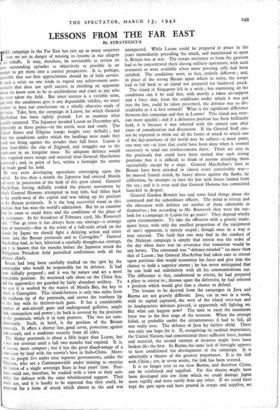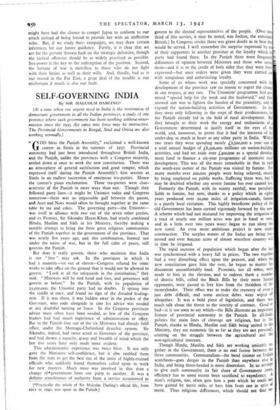LESSONS FROM THE FAR EAST
By STRATEGICUS
HE campaign in the Far East has cast up so many surprises that we are in danger of missing its lessons in our chagrin it its rebuffs. It may, therefore, be serviceable to review its more outstanding episodes as objectively as possible in an attempt to get them into a correct perspective. It is, perhaps, inevitable that our first appreciations should be of little service. In such a crisis no one tends to regard any achievement over- seriously that does not spell success in checking an opponent whom we know now to be as unchivalrous and cruel as any who has ever taken the field. But since success is a variable term, d only the conditions give it any dependable validity, we must tempt to base our conclusions on a wholly objective study of he facts. Take, first, the campaign in Luzon, for which General lacArthur has been rightly praised. Let us examine what ctually occurred. The Japanese invaded Luzon on December 9th, apparently at three points—in the north, west and south. The United States and Filipino troops fought very skilfully ; but from the conditions under which the landings were made they could not bring against the invader their full force. Luzon is about four-fifths the size of Enzland, and straggles out to the south-east in an irregular mass. Its adequate defence would have required more troops and material than General MacArthur possessed ; and, in point of fact, within a fortnight the enemy hid made good his hold.
He was even developing operations converging upon the capital. In less than a month the Japanese had entered Manila and were in possession of the bulk of this great island. General MacArthur, having skilfully evaded the pincers movement by which General Homma attempted to trap him, had fallen back to the north-west of the capital and was taking up his position in the Bataan peninsula. It is the long successful stand in this position that has won the world's admiration. But let us examine how he came to stand there and the conditions of the place of his resistance. In his broadcast of February 23rd, Mr. Roosevelt said: " For 4o years it has always been our strategy—a strategy born of necessity—that in the event of a full-scale attack on the islands by Japan we should fight a delaying action and retire slowly into the Bataan peninsula and to Corregidor." General MacArthur had, in fact, inherited a carefully thought-out strategy, and it is known that for months before the Japanese attack the Philippines President held periodical conferences with all the defence chiefs.
Bataan had long been carefully studied on the spot by the commander who would be responsible for its defence. It had been skilfully prepared ; and it was by nature and art a most formidable position. Its westward side abuts on the China Sea, and the approaches are guarded by fairly abundant artillery. To the east it is washed by the waters of Manila Bay, the key to which is Corregidor. This island-fortress is only two miles from the southern tip of the peninsula, and covers the southern lip of the bay with its thirteen-inch guns. It has a considerable number of anti-aircraft guns and underground galleries, ample food, ammunition and power ; its back is covered by the positions on the peninsula which it in turn protects. The two are com- plementary. Such, in brief, is the position of the Bataan Peninsula. It offers a shorter line, good cover, protection against tank-assault, and a moderate security from all sides.
The Malay peninsula is about a fifth larger than Luzon, but it was not overrun until a full two months had expired. It is, of course, more compact ; but it has the great disadvantage of a connexion by land with the enemy's base in Indo-China. More- over, its people live under nine separate governments, unlike the Filipinos, who are a Commonwealth under training to exercise the duties of a single sovereign State in four years' time. Posi- tions could not, therefore, be studied with a view to their suit- ability for defence with the same wholehearted support. They could not, and it is hardly to be expected that they could, be Prepared for a form of attack which almost to the end was
unexpected. While Luzon could be prepared in peace in the years immediately preceding the attack, and munitioned to meet it, Britain was at war. The troops necessary to form the garrison had to he concentrated there during military operations, with such resources as were available when more pressing calls had been satisfied. The conditions were, in fact, entirely different ; and, in place of the strong Bataan upon whicil to retire, the troops had to fall back to an island not prepared for landward attack.
The island of Singapore fell in a week ; but examining all the conditions can it be said that, with merely a token air-support and a force that, from the conditions under which it was put into the line, could be taken piecemeal, the defence was so dis- creditable as it at first seemed? What is the significant difference between this campaign and that in Luzon? This island was over- run more quickly ; and if a defensive position has been brilliantly held, it is because it was selected with the utmost care after years of consideration and discussion. If the General Staff can- not be expected to think out all the forms of attack to which one of the key-positions of the world may be subject—a moot point, one may say—at least that could have been done when it seemed necessary to send out reinforcements there. There are sites in the peninsula that could have been turned into such strong positions that it is difficult to think of anyone attacking them successfully except by a siege. General MacArthur's lines in Bataan have been attacked in almost every conceivable way— by massed frontal attack, by heavy drives against the flanks, by infiltration, by attempts to tuna the line with forces landed from the sea ; and it is even said that General Homma has committed hara-kiri in despair.
General Gordon Bennett has said some hard things about the command and the subordinate officers. The mind to retreat and the obsession with defence are neither of them admirable in themselves ; but according to Mr. Roosevelt they were the out- look for a campaign in Luzon for 4o years! They depend wholly upon circumstances. To take the offensive with a grossly inade- quate force, with only the smallest proportion of the equipment of one's opponent, is merely stupid ; though once in a way it may succeed. The fault that one may find in the conduct of the Malayan campaign is simply that retreat was the order of the day when there was no assurance that tomorrow would be any better. The command was " defence-minded " no more that% that of Luzon ; but General MacArthur had taken care to retreat upon positions that would economise his force and give him the chance to hold a superior enemy ; he has never anticipated that he can hold out indefinitely with all his communications cut. The difference is that, condemned to retreat, he had prepared a place to retreat to ; thrown upon the defensive, he had selected a position which would give him a chance to defend.
The lessons to be derived from the campaigns in Java and Burma are not gravely different. Java, cut in two in a week, with its capital captured, the west of the island over-run and its headquarters defences pierced, is apparently still fighting on. But what can happen now? The time to exert the maximum force was in the first stage of the invasion. When the attempt failed, as probably under the circumstances it had to fail, all was really over. The defence of Java lay farther afield. There was only one hope for it. If, recognising its cardinal importance, the United Nations had concentrated there sufficient force, human and material, the second attempt at invasion might have been broken like the first. In Burma the same lack of foresight appears to have conditioned the development of the campaign. It is admittedly a theatre of the greatest importance. It is the link with China ; yet, in seven weeks, the link has been severed.
It is no longer easy to see how Burma, and therefore China, can be reinforced and supplied. Yet this theatre might have been developed into one from which we could damage Japan more rapidly and more surely than any other. If we could have kept the gate open and have poured in troops and supplies, we might have had the chance to compel Japan to conform to our attack instead of being forced to provide her with an ineffective echo. But, if we study thest campaigns, we may draw certain inferences for our future guidance. Firstly, it is clear that we are for the present thrown back on the strategic defensive, though the tactical offensive should be as widely practised as possible. Sea-power is the key to the redemption of the position. Second, the fortune of war is merciless to those who do not fight with their brains as well as their wills. And, thirdly, bad as is our record in the Far East, a great deal of the trouble is our misfortune if much is also our fault.



























 Previous page
Previous page